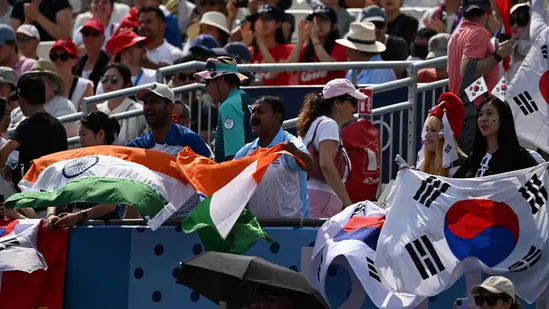For most indians, South Korea is symon-ymous with major brands like LG, others, or with K-pop and K-drama. Foe Koreans, India is where they export these to. If you take them out of the equation, the bilateral relationship isn’t very exciting, may be even a tad boring For Delhi-Seoul relations to go beyond this, the two sides have to have bold idcas. What struck me during my recent visit to South Korea to attend the Seoul Diplomacy Forum was a poverty of such ideas to forge a bilateral strategic partnership despite a Korean desire to do so.
The strategic circumstances that can foster these ideas exist. What is missing could be political will. While New Delhi is too preoc cupied, Scoul may be moving a bit too stowty. Let’s first understand Scoul’s new strategie context that could potentially change its siow-paced relationship with India. North Korea getting away with its nuclear weapons program by wooing Donald Trump, partnering with Vladimir Putin’s Russia, and manipulating Beijing – along with Kim Jong Un’s garbage balloons has sent alarm bells ringing In Seoul.
North Korean nuclear adventurism and the international community’s inability to chock this has convinced many Korean strategic thinkers that should Kim Un’s an attack on South Korea, the United States (US) might not come to its aid. The recent North Korea-Russia defense arrangements has sharply heightened Seoul’s concerns. Then, there is China’s ever-increasing assertiveness in the region. For Seoul, this presents a four stroke security puzzle.
This has forced an otherwise strategically cautious South Korea to look for new partners, solutions, and strategies. It seems to have come up with a mulépronged approach – some official, some gaining momentum within the Korean strategic community, and others still taking shape. First of all, there is a fastgrowing nuke-for-nuke narrative among Seoul’s strategic elite. The more Kim’s nuclear arsenal matures, the less the international community seems to be able to keep him in check. And the more uncertain the American security guarantees become, the sharper the Korean nuclear argument gets, even though South Korea’s official position continues to be anti-nuclear.
The second piece of the Korean response to its security dilemma has boen to reconcile with its former coloniser, Japan. Kim’s threats, China’s aggression, and America’s ambivalence — many of Seoul’s challenges are Japan’s as well. For Scoul today, contemporary security challenges are far more
WITH OR WITHOUT THE US, IF REGIONAL STATES IN THE INDO-PACIFIC WORK TOGETHER ON REGIONAL SECURITY ISSUES, TI WOULD WORK AS A FORMIDABLE FORCE OF DISSUASION TOWARDS CHINESE AGGRESSION
consequential than memories of historical subjugation. Last year’s Camp David summit Derween Japan, the US, and South Korea was Just the beginning South Korea is also sionty shedding its strategic ambivalence, not just regarding China. Having abandoned its initial hesitation regardIng indo-Pacific and Quad (for fear of getting caught in a gcopolitical competition between the US and China in the region). Seoul today has an Indo Pacific strategy and might even be open to working with indo-Pacific mini-laterals such as Quad. It also launched a New Southern Policy aiming to broaden its strategic periphery, emerge from China’s sphercof influence, and engage with new actors in the wider neighbourhood as it socks to be a “global pivotal state”.
This is where India comes in. The rising gcopolitical tensions in the Korcan peninsula, South Korea’s determination to come out of Beijing’s strategic orbit. and India’s growing interest in the Indo-Pacific provide an opportunity for Seoul and Delhi to discover each other’s strategie potential and infuse new energy and direction into their strategic partnership. The two have a lot more in common than is generally understood. The two sides have hardly any disagreements, have lots of positive sentiments regarding each other, and there are many areas for potential cooperation. Both view China as a challange but are careful about how to address the challenge given the physical prodmity and strong economic relationship. More so, the fact that both Delhi and Seoul today are less concerned about what Beijing will think of their respective strategic postures further creates possibilities for the two to work together.
China is indeed the biggest military and economic power in the region, but a coming together of like minded countries in the region has enough ballast to deal with it, or at least make Beijing think twice before it gets too aggressive, Consider this: With or without the US, If regional States in the Indo-Pacific, such as Australia, India, Japan, and South Korea, engage in strategic consultations, work together on regional security issues, and collectively send out the right messages, it would work as a formidable force of dissuasion towards Chinese aggression. Coming back to Delhi-Seoul relations, the resetting of the Seoul-Delhi relationship must have at least four parts, A deeper and structured political engagement, upgrading the relationship from the current joint commission level so a 2+2 format, defense coproduction including for third-country markets, and most importantly, a joint India-South Korea Initiative on Critical and Emerging Technologies (ICET) like the one between New Delhi and Washington.
As the two strategic communities deepen their engagement, a touch of pop culture can further enhance mutual understanding, So, when South Korean diplomats in India recreate NeataNautu. It’s only fitting that Indians give Gangnam Style a shot.
Excerpts: Hindustan Times
Happymon Jacob teaches India’s foreign policy at INU, and is the founder of the Council for strategic and Defense Research. The views expressed are personal




COMMENTS